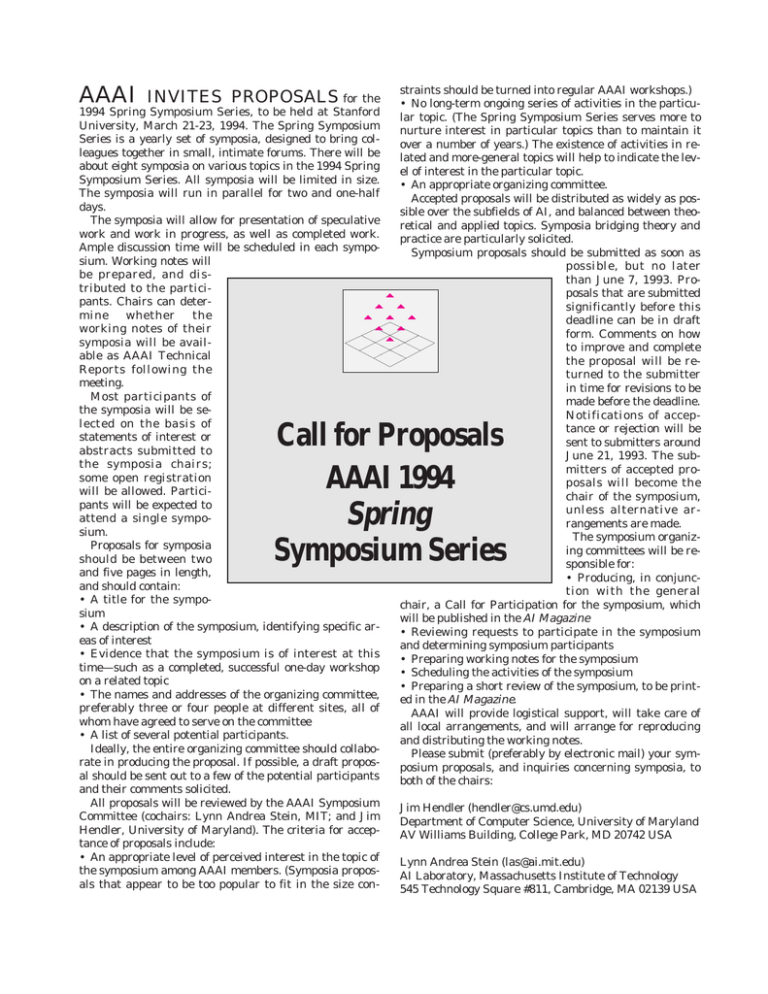AAAI INVITES PROPOSALS
advertisement

AAAI INVITES PROPOSALS for the 1994 Spring Symposium Series, to be held at Stanford University, March 21-23, 1994. The Spring Symposium Series is a yearly set of symposia, designed to bring colleagues together in small, intimate forums. There will be about eight symposia on various topics in the 1994 Spring Symposium Series. All symposia will be limited in size. The symposia will run in parallel for two and one-half days. The symposia will allow for presentation of speculative work and work in progress, as well as completed work. Ample discussion time will be scheduled in each symposium. Working notes will be prepared, and distributed to the participants. Chairs can determine whether the working notes of their symposia will be available as AAAI Technical Reports following the meeting. Most participants of the symposia will be selected on the basis of statements of interest or abstracts submitted to the symposia chairs; some open registration will be allowed. Participants will be expected to attend a single symposium. Proposals for symposia should be between two and five pages in length, and should contain: • A title for the symposium • A description of the symposium, identifying specific areas of interest • Evidence that the symposium is of interest at this time—such as a completed, successful one-day workshop on a related topic • The names and addresses of the organizing committee, preferably three or four people at different sites, all of whom have agreed to serve on the committee • A list of several potential participants. Ideally, the entire organizing committee should collaborate in producing the proposal. If possible, a draft proposal should be sent out to a few of the potential participants and their comments solicited. All proposals will be reviewed by the AAAI Symposium Committee (cochairs: Lynn Andrea Stein, MIT; and Jim Hendler, University of Maryland). The criteria for acceptance of proposals include: • An appropriate level of perceived interest in the topic of the symposium among AAAI members. (Symposia proposals that appear to be too popular to fit in the size con- straints should be turned into regular AAAI workshops.) • No long-term ongoing series of activities in the particular topic. (The Spring Symposium Series serves more to nurture interest in particular topics than to maintain it over a number of years.) The existence of activities in related and more-general topics will help to indicate the level of interest in the particular topic. • An appropriate organizing committee. Accepted proposals will be distributed as widely as possible over the subfields of AI, and balanced between theoretical and applied topics. Symposia bridging theory and practice are particularly solicited. Symposium proposals should be submitted as soon as possible, but no later than June 7, 1993. Proposals that are submitted significantly before this deadline can be in draft form. Comments on how to improve and complete the proposal will be returned to the submitter in time for revisions to be made before the deadline. Notifications of acceptance or rejection will be sent to submitters around June 21, 1993. The submitters of accepted proposals will become the chair of the symposium, unless alternative arrangements are made. The symposium organizing committees will be responsible for: • Producing, in conjunction with the general chair, a Call for Participation for the symposium, which will be published in the AI Magazine • Reviewing requests to participate in the symposium and determining symposium participants • Preparing working notes for the symposium • Scheduling the activities of the symposium • Preparing a short review of the symposium, to be printed in the AI Magazine. AAAI will provide logistical support, will take care of all local arrangements, and will arrange for reproducing and distributing the working notes. Please submit (preferably by electronic mail) your symposium proposals, and inquiries concerning symposia, to both of the chairs: Call for Proposals AAAI 1994 Spring Symposium Series Jim Hendler (hendler@cs.umd.edu) Department of Computer Science, University of Maryland AV Williams Building, College Park, MD 20742 USA Lynn Andrea Stein (las@ai.mit.edu) AI Laboratory, Massachusetts Institute of Technology 545 Technology Square #811, Cambridge, MA 02139 USA


